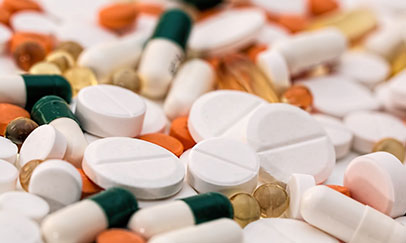Drugs and medicines are a part of life. In youth their requirement is infrequent. However, in advancing years the need for medicines, often more than one, increases. There are several reasons why people in later life should take extra care with medicines.
The doses of medicines we may need are likely to be smaller as our liver and kidneys become less efficient at removing medicines, so that they stay active in the body for longer periods. These are normal phenomena and you should take extra care not to exceed the recommended dose of medicine. Some guidance in managing medicines are provided in this chapter.
NAMES OF MEDICINES
Most medicines have two names. Brand name or trade name is the name given to a medicine by its manufacturer whereas the approved name or the pharmacological name is the name of its ingredients. It does not matter what particular brand of medicine is used; however, it is better to keep the brand unchanged. Whenever you buy a new medicine always check its approved name so that you avoid ingredients that you may already be taking. While buying over-the-counter (OTC) medicine, it is also advisable to ask the pharmacist if it suits your prescription medicine.

REDUCING SIDE-EFFECTS
There is no medicine which is free of side-effects, while side-effects are not necessarily bound to happen. Taking some precautions can reduce the likelihood of a drug side-effect.
SAFE-KEEPING
Never share your medicines. Always keep medicines from out of reach of children even if children are not regularly in the house. Medicines need to be stored in a cool and dry place for longer life.
USE BEFORE EXPIRY
Like foods, all medicines have a limited shelf-life. So it is best to obtain small quantities and to make sure that medicines are not in use after their “use by” (expiry) date. Creams and ointments usually have the date marked at the end of the tube. If you can’t find a date on the medicine container, then, as a rule of thumb, do not keep tablets or capsules for longer than a year. Liquids should only be kept for six months.
You can avoid using “out of date” medicines by destroying them when they are no longer needed. Do not hold on to them for a “rainy day”.
REMEMBERING MEDICINES
Remembering to take medicines is sometimes difficult. Organize the medicine times so that they suit you best. Meal times are often a good time to take medicines because you are likely to have a drink ready at hand. If the instructions on the label tell you to take the medicine on an empty stomach, then you should try to take the medicine at least one hour before a meal. This mainly applies to antibiotics.
DROPS, CREAMS AND INHALERS
Eye, ear and nose drops should be treated the same way as tablets and capsules as these can also give rise to side-effects. Never share your drops with anyone else. Once an eye drop container is opened, it should be used for no longer than a month. Try not to actually touch the eye when putting in your drops. Creams and ointments are also medicines and should also be handled with care. Always wash your hands before and after using a cream or ointment.
Inhalers are a modern system of delivering the medicine as a fine mist into the lungs to help breathing. However, co-ordinating the pressing of the puffer and breathing in at the right time is often not easy. Many people never manage to get the correct dose of medicine. Alternatively, you could use a spacer with the inhaler which is much easier to operate. If you have problems with your inhaler, check with your doctor that you are using it correctly.
REPEAT PRESCRIPTIONS
If you are taking medicines regularly, you may repeat prescriptions without seeing the doctor. However, it is necessary to make sure that you still see your doctor at regular intervals. You may no longer need a medicine or the dose may need adjusting. Regular checks are essential in order to reduce the risk of side-effects and to make sure that you are not taking medicines unnecessarily. If you think that you may have experienced side-effects you should mention this to your doctor even if it seems trivial. It is easy to forget to ask the doctor about things like this, so it may help to write down the questions you want to ask before you go to act as a reminder during the consultation.